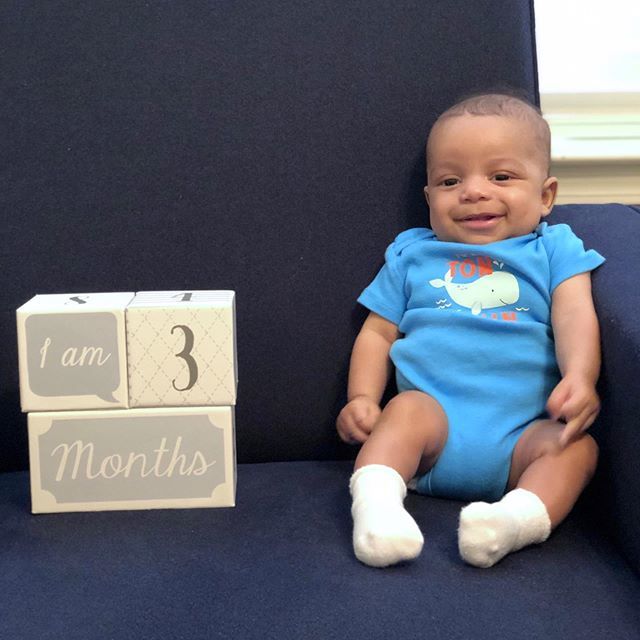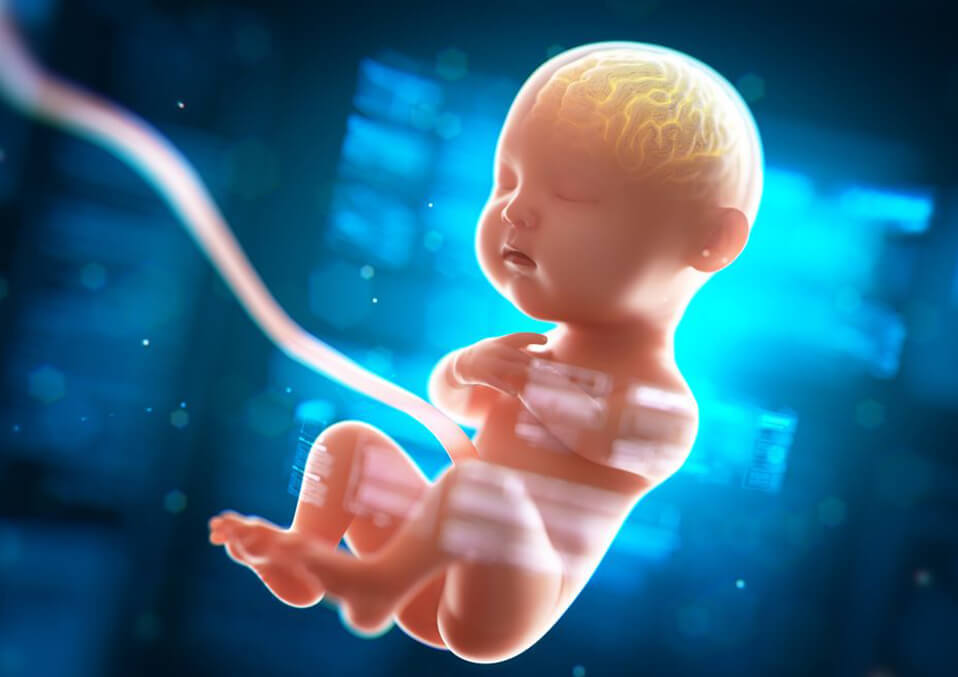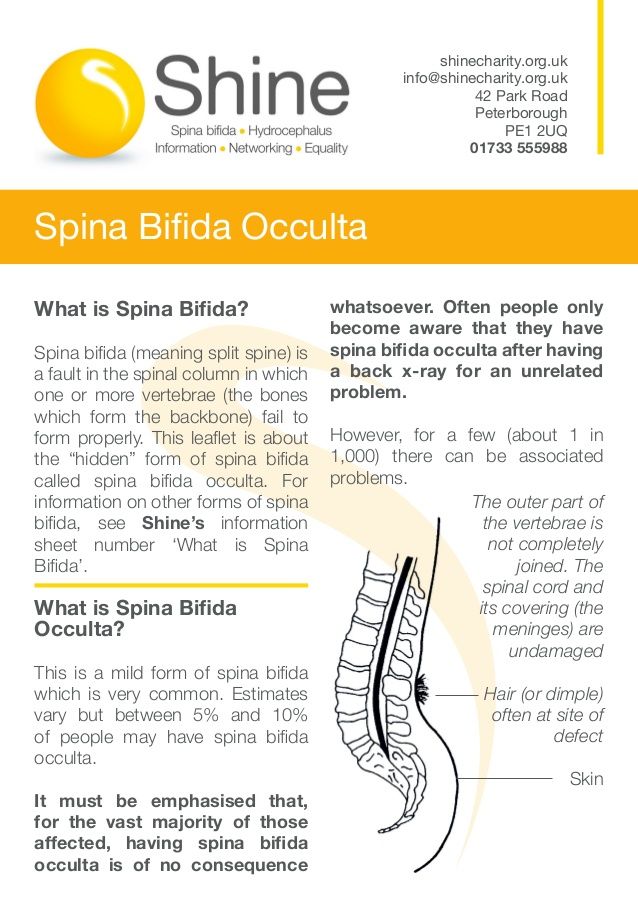Will you always bleed with a miscarriage
Miscarriage without bleeding: Symptoms and diagnosis
Most of the time, bleeding is the first sign of a miscarriage. However, a miscarriage can occur without bleeding, or other symptoms may appear first.
Many women prefer the term pregnancy loss to miscarriage. Pregnancy loss is most common within the first weeks of pregnancy, and the risk steadily declines as the pregnancy progresses.
It is important to remember that pregnancy symptoms shift over time. These changes do not always signal a pregnancy loss.
Anyone who believes that they have lost a pregnancy, with or without bleeding, should seek medical attention.
Pregnancy losses do not always involve bleeding. In fact, a woman may not experience any symptoms and only learn of the loss only when a doctor cannot detect a heartbeat during a routine ultrasound.
Bleeding during pregnancy loss occurs when the uterus empties. In some cases, the fetus dies but the womb does not empty, and a woman will experience no bleeding.
Some doctors refer to this type of pregnancy loss as a missed miscarriage. The loss may go unnoticed for many weeks, and some women do not seek treatment.
According to the American Pregnancy Association, most losses occur within the first 13 weeks of pregnancy. While an estimated 10–25 percent of all recognized pregnancies end in a pregnancy loss, a loss in the second trimester is very rare.
Some women have no external symptoms of pregnancy loss. When the loss occurs early on, a woman may have few signs of pregnancy, which can make identifying the loss more difficult.
It is normal to experience changes in pregnancy signs over time, particularly in the transition from the first to the second trimester. These changes do not usually indicate the loss of the pregnancy.
Some warning signs of a pregnancy loss without bleeding include:
- a sudden decrease in pregnancy signs
- pregnancy tests that show a negative result
- nausea, vomiting, or diarrhea
- back pain
If the pregnancy has advanced, fetal movement may noticeably slow or stop.
Most women seek treatment for a pregnancy loss when they experience bleeding. When there is no bleeding, a doctor may only diagnose a loss during a routine scan.
A doctor may also suspect a loss because of other indications, such as a drop in the levels of pregnancy hormones or an unusual decrease in other pregnancy signs.
Blood tests can determine the levels of hormones, which can help to assess the likelihood of a pregnancy loss. To conclusively diagnose a loss, a doctor must perform an ultrasound to check for a heartbeat.
The heartbeat does not develop until 6.5–7 weeks of gestation, so the absence of a heartbeat before this time does not indicate a loss.
To confirm a pregnancy loss, a doctor may choose to perform scans on multiple days.
To determine the reason for a loss, a doctor may also recommend genetic testing, further ultrasound scans, or blood testing.
The goal of treatment is to remove the fetus and tissue from the uterus and to prevent complications, such as a uterine infection. There is a variety of treatment options available, and a doctor or midwife will be able to advise on the best option.
There is a variety of treatment options available, and a doctor or midwife will be able to advise on the best option.
When pregnancy loss occurs without bleeding, it is often safe to wait for a few weeks before seeking treatment, because the uterus may empty on its own.
When this occurs, a woman can expect bleeding that involves passing the tissue. This usually lasts for less than a week, and cramping may accompany it.
If the uterus does not empty, or if a woman does not want to wait, the most common treatment options are:
- medication that encourages the release of the fetus
- a surgical procedure called dilation and curettage
A doctor may recommend pain medication to reduce associated cramping. Over-the-counter varieties are often effective. If they do not work, a doctor can prescribe something stronger.
In rare cases, pregnancy loss leads to a uterine infection, which requires treatment.
It is essential to consider mental health when choosing a course of treatment.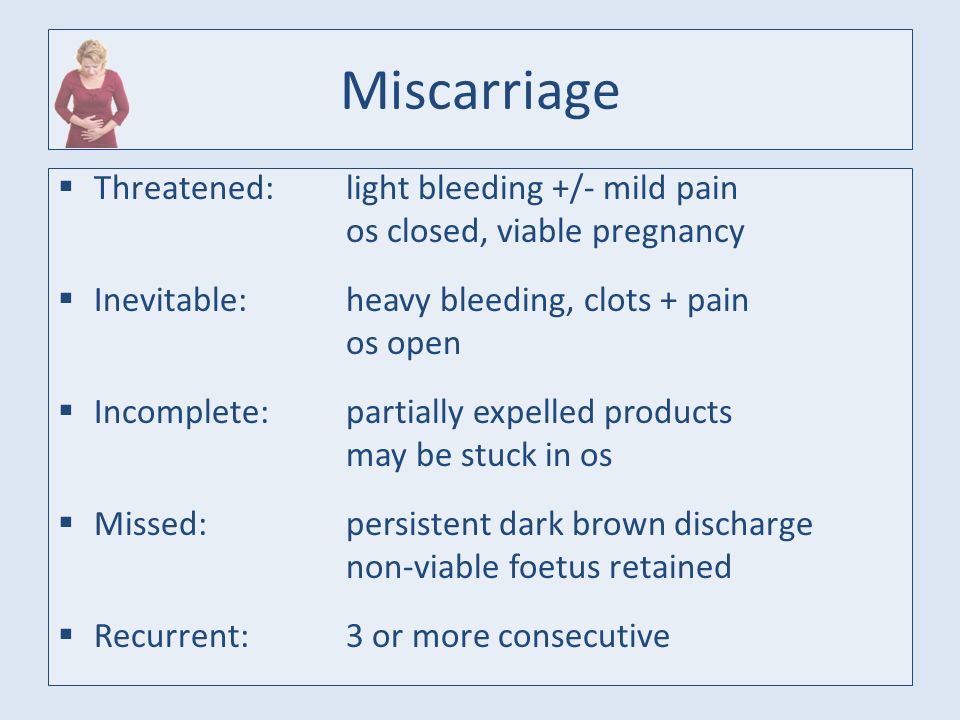 Many women feel immense grief following a pregnancy loss. Guilt and anxiety are also common responses.
Many women feel immense grief following a pregnancy loss. Guilt and anxiety are also common responses.
Therapy and support groups can help. Some women might also benefit from using antianxiety or antidepressant medications.
Many women worry that they are responsible for the loss of their pregnancies. In most cases, this is untrue, and the loss is outside of a person’s control.
The most common cause of a pregnancy loss is a chromosomal abnormality that would have made it impossible for the baby to survive.
Less common causes include:
- infections
- illnesses
- physical injuries
- abnormalities in the uterus or other reproductive organs
- untreated medical conditions, such as diabetes or kidney failure
- uterine polyps or adhesions
- endometriosis
The recovery time associated with a pregnancy loss depends on many factors, including how far along the pregnancy was.
For most women, the time to physically recover is relatively short. Women who undergo surgical removal of the fetus may experience no physical symptoms after any associated bleeding has stopped.
Women who undergo surgical removal of the fetus may experience no physical symptoms after any associated bleeding has stopped.
Those who experience complications, such as a uterine infection, can expect a longer recovery time.
However, the emotional effects of a pregnancy loss can last much longer. Some women grieve for a lifetime. Others feel better after conceiving another baby.
There is no standard timeline, no right way to grieve, and no right way to feel about a pregnancy loss.
Many women find that talking to loved ones, joining a support group, and meeting with a therapist who specializes in pregnancy loss helps.
A 2016 study found that women can safely try to become pregnant again during the cycle that follows a pregnancy loss. In fact, the researchers found that the odds of becoming pregnant may be slightly higher after a loss. Women who are ready to try again should not feel as though they have to wait.
Following a pregnancy loss, many women worry that they will be unable to become pregnant again. However, losses are common and the issues responsible often do not recur.
However, losses are common and the issues responsible often do not recur.
There is no right way to respond to the loss of a pregnancy. Many people need time to grieve, while others want to try again right away.
Likewise, losses can occur in many ways. Some involve no physical symptoms, while others are painful and require surgery.
Working with trusted healthcare providers can help a woman to deal with the physical and emotional effects of a pregnancy loss.
Miscarriage Without Bleeding: How to Tell
Miscarriage Without Bleeding: How to TellMedically reviewed by Debra Sullivan, Ph.D., MSN, R.N., CNE, COI — By Rachel Nall, MSN, CRNA on December 13, 2018
What is a miscarriage?
A miscarriage is also known as pregnancy loss. Up to 25 percent of all clinically diagnosed pregnancies end in miscarriage.
A miscarriage is most likely to occur in the first 13 weeks of pregnancy. Some women may experience miscarriage before they realize they were pregnant. While bleeding is a common symptom associated with miscarriage, there are other symptoms that can occur, too.
While bleeding is a common symptom associated with miscarriage, there are other symptoms that can occur, too.
What are the most common symptoms of a miscarriage?
Vaginal bleeding and/or spotting are common symptoms of a miscarriage. Some women may mistake a miscarriage for a menstrual period. But it’s not the only sign. Other symptoms of a miscarriage include:
- back pain
- diarrhea
- nausea
- pelvic cramping (may feel like you’re getting your period)
- severe abdominal pain
- fluid coming from your vagina
- tissue coming from your vagina
- unexplained weakness
- the disappearance of other pregnancy symptoms, such as breast soreness or morning sickness.
If you do pass pieces of tissue from your vagina, your doctor will likely advise keeping any pieces in a container. This is so they can be analyzed. When a miscarriage occurs very early, the tissue may look like a small blood clot.
Some women may experience light bleeding or spotting during a normal pregnancy. If you’re uncertain if your bleeding levels are normal, call your doctor.
How does a doctor confirm your miscarriage?
If you’ve had a positive pregnancy test and are concerned that you may have lost your baby, contact your doctor. They will conduct several exams to determine if a miscarriage has occurred.
This includes an ultrasound to determine if your baby is present in the womb and has a heartbeat. Your doctor may also test your hormone levels, such as your human chorionic gonadotropin (hCG) levels. This hormone is commonly associated with pregnancy.
Even if you’re certain you had a miscarriage, it’s important to see your doctor. This is because it’s possible that even if you passed some tissue from your body, some may remain. This can be dangerous for your health.
Your doctor may recommend procedures to remove any fetal or placental tissue. Examples include a dilation and curettage (D and C), which removes any fetal tissues from the uterus.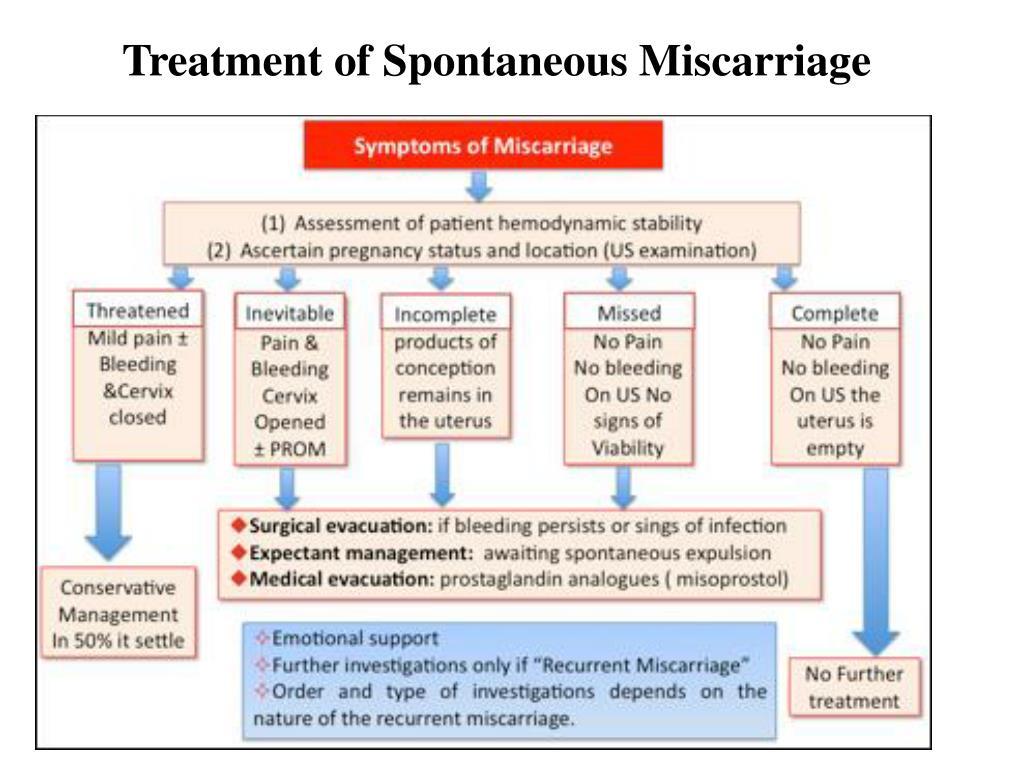 This allows your uterus to heal and ideally prepare itself for another healthy pregnancy.
This allows your uterus to heal and ideally prepare itself for another healthy pregnancy.
Not all women who’ve had a miscarriage require a D and C. But if a woman experiences heavy bleeding and/or signs of infection, surgical intervention may be required.
What causes a miscarriage?
For the most part, miscarriages are caused by chromosomal abnormalities. Often, the embryo doesn’t divide and grow properly. This results in fetal abnormalities that keep your pregnancy from progressing. Other factors that could cause a miscarriage include:
- hormone levels that are too high or low
- diabetes that isn’t well-controlled
- exposure to environmental hazards like radiation or toxic chemicals
- infections
- a cervix that opens and thins before a baby has had enough time to develop
- taking medications or illegal drugs known to harm a baby
- endometriosis
Your doctor may know what caused your miscarriage, but sometimes the miscarriage cause is unknown.
Miscarriage at home or medical facility
If you suspect a miscarriage has happened or believe a miscarriage is about to take place, see your doctor, who may perform an ultrasound or blood test.
These tests might indicate a miscarriage is likely. When this is the case, a woman may choose to miscarry at a medical facility or at home.
Miscarrying at a medical facility like a hospital, surgery center, or clinic, involves a D and C procedure. This involves removing any tissue from the pregnancy. Some women prefer this option instead of awaiting bleeding, cramping, and other potential miscarriage symptoms.
Other women may choose to miscarry at home without undergoing a minor surgical procedure. A doctor can prescribe a medication known as misoprostol (Cytotec), which causes uterine contractions that can contribute to miscarriage. Other women may allow the process to happen naturally.
The decision on how to proceed with a miscarriage is an individual one. A doctor should weigh each option with you.
A doctor should weigh each option with you.
What’s the recovery period like after miscarriage?
If your doctor does say you’re having a miscarriage, your symptoms may persist for anywhere from one to two weeks. Your doctor may recommend avoiding tampons or engaging in intercourse during this time. This is an infection-prevention measure.
While you can expect some spotting, bleeding, or cramping, there are some symptoms you should call your doctor about immediately. These could indicate a post-miscarriage infection or hemorrhage.
Let your doctor know if you experience:
- chills
- soaking more than two pads an hour for two hours or more in a row
- fever
- severe pain
Your doctor may prescribe antibiotics or conduct further testing to determine if an infection is taking place. You may also wish to contact your doctor if you’re feeling dizzy or tired. This can indicate anemia.
The takeaway
While the physical recovery period after a miscarriage may take a few weeks, the mental recovery period can be much longer.
You may wish to find a support group, such as Share Pregnancy and Loss Support. Your doctor may also know of pregnancy loss support groups in your area.
Experiencing a miscarriage doesn’t mean that you’ll never get pregnant again. Many women go on to have successful and healthy pregnancies.
If you’ve had multiple miscarriages, your doctor may perform tests to determine if you have medical conditions or abnormalities. These could indicate you have a condition that affects your ability to get pregnant. Talk to your doctor about your concerns.
Q:
Am I able to have a healthy pregnancy after experiencing a miscarriage?
Anonymous patient
A:
In most cases, having a miscarriage is a one time
event. Most women are able to go on to have a healthy pregnancy and delivery
without needing any further intervention. But there are a small number of women
who will go on to have multiple miscarriages. Sadly, the rate of pregnancy loss
increases with each subsequent miscarriage. If this happens to you, make an
If this happens to you, make an
appointment with your obstetrician or a fertility specialist to be evaluated.
Nicole Galan, R.N.
Answers represent the opinions of our medical experts. All content is strictly informational and should not be considered medical advice.
Last medically reviewed on December 14, 2018
- Parenthood
- Pregnancy
- Pregnancy Complications
How we reviewed this article:
Healthline has strict sourcing guidelines and relies on peer-reviewed studies, academic research institutions, and medical associations. We avoid using tertiary references. You can learn more about how we ensure our content is accurate and current by reading our editorial policy.
- Early pregnancy loss. (2015).
acog.org/-/media/For-Patients/faq090.pdf - Miscarriage. (2015).
kidshealth.org/en/parents/miscarriage. html
html - Miscarriage. (2016).
mayoclinic.org/diseases-conditions/pregnancy-loss-miscarriage/basics/definition/con-20033827 - Miscarriage. (2017).
marchofdimes.org/complications/miscarriage.aspx# - Miscarriage. (2017).
americanpregnancy.org/pregnancy-complications/miscarriage/ - Misoprostol. (2018).
drugs.com/cdi/misoprostol.html - Symptoms and signs of miscarriage. (n.d.).
floridahospital.com/miscarriage/symptoms-and-signs
Our experts continually monitor the health and wellness space, and we update our articles when new information becomes available.
Current Version
Dec 14, 2018
Written By
Rachel Nall, MSN, CRNA
Edited By
Nizam Khan (TechSpace)
Medically Reviewed By
Debra Sullivan, PhD, MSN, RN, CNE, COI
Share this article
Medically reviewed by Debra Sullivan, Ph.D., MSN, R.N., CNE, COI — By Rachel Nall, MSN, CRNA on December 13, 2018
related stories
When Is the Best Time to Announce Your Pregnancy?
A Breakdown of Miscarriage Rates by Week
What’s a Chemical Pregnancy?
How Long Does a Miscarriage Last?
Late Miscarriage: Symptoms and Finding Support
Read this next
When Is the Best Time to Announce Your Pregnancy?
Medically reviewed by Deborah Weatherspoon, Ph.
 D., MSN
D., MSNIf you’re expecting, you might be wondering when it’ll be safe to tell family and friends. Here’s how to decide when to share the news of your…
READ MORE
A Breakdown of Miscarriage Rates by Week
Medically reviewed by Holly Ernst, PA-C
A miscarriage is the early loss of a pregnancy before the 20th week of pregnancy. Unfortunately, miscarriages are common in the first trimester. The…
READ MORE
What’s a Chemical Pregnancy?
Medically reviewed by Debra Rose Wilson, Ph.D., MSN, R.N., IBCLC, AHN-BC, CHT
A chemical pregnancy is an early pregnancy loss that occurs shortly after implantation. Chemical pregnancies may account for 50 to 75 percent of all…
READ MORE
How Long Does a Miscarriage Last?
Medically reviewed by Holly Ernst, PA-C
The loss of a pregnancy before 20 weeks is considered a miscarriage.
 The length of time a miscarriage lasts varies from woman to woman, as do the risk…
The length of time a miscarriage lasts varies from woman to woman, as do the risk…READ MORE
Late Miscarriage: Symptoms and Finding Support
Medically reviewed by Kimberly Dishman, MSN, WHNP-BC, RNC-OB
It can be devastating to experience a miscarriage in your second trimester. Find support and information here.
READ MORE
Why Vaginal Pressure During Pregnancy Is Totally Normal
Medically reviewed by Nicole Galan, RN
Many pregnant women experience vaginal and/or pelvic pressure. Here's why it happens and how to find relief.
READ MORE
Everything You Need to Know About Miscarriage
Medically reviewed by Deborah Weatherspoon, Ph.D., MSN
A miscarriage is the loss of a fetus during pregnancy. It’s also an event that’s more common than you think.
 Learn about causes, types, symptoms, and…
Learn about causes, types, symptoms, and…READ MORE
Depression After a Miscarriage
Medically reviewed by Janine Kelbach, RNC-OB
It’s not uncommon to experience depression after the sudden loss of a pregnancy. Learn how to cope with the depression associated with miscarriage.
READ MORE
Pregnancy Complications
Medically reviewed by Michael Weber, MD
Sometimes a pregnant woman’s existing health conditions can contribute to problems, and other times new conditions arise because of body and hormonal…
READ MORE
Why We Need to Talk About Depression During Pregnancy
Perinatal depression is depression during pregnancy, and it's a very real and serious illness many women experience — often alone.
READ MORE
Miscarriage, symptoms - Health Clinic 365 Yekaterinburg
Causes of miscarriage
Questions to the doctor about miscarriage
Diagnosis of miscarriage
Treatment and prevention of miscarriage
According to statistics, 10 to 20% of all pregnancies end in miscarriage.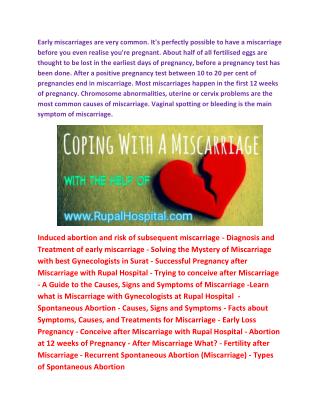 However, the real numbers could be much higher, as a large number of miscarriages happen very early, and women are not even aware of their pregnancy. Most miscarriages happen due to abnormal development of the fetus.
However, the real numbers could be much higher, as a large number of miscarriages happen very early, and women are not even aware of their pregnancy. Most miscarriages happen due to abnormal development of the fetus.
Miscarriage is quite common, but this fact does not make things any easier. It is always difficult to cope with the realization that there was a pregnancy, but no child. Try to deal with the situation psychologically and understand what could be causing the miscarriage, what increases the risk of it, and what type of treatment might be needed.
Miscarriage symptoms .
Most miscarriages occur before 12 weeks. Signs and symptoms of a miscarriage include:
- Vaginal bleeding or spotting (although quite common in early pregnancy)
- Pain or cramps in the abdomen or lower back
- Fluid vaginal discharge or tissue fragments
It is important to consider the fact that in early pregnancy, spotting or vaginal bleeding is quite common.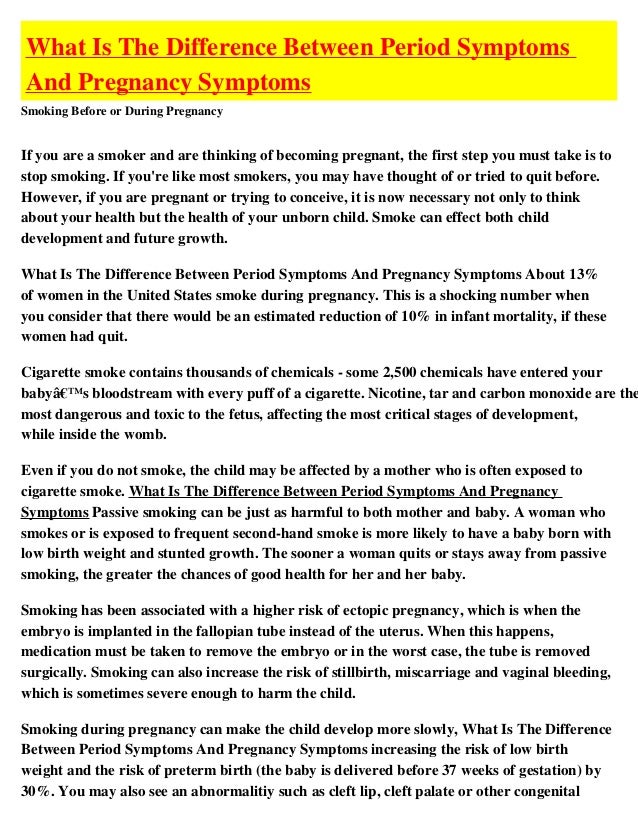 In most cases, women who experience light bleeding during the first three months have an uneventful pregnancy thereafter. In some cases, even with heavy bleeding, the pregnancy does not end in a miscarriage.
In most cases, women who experience light bleeding during the first three months have an uneventful pregnancy thereafter. In some cases, even with heavy bleeding, the pregnancy does not end in a miscarriage.
Some women who have a miscarriage develop an infection in the uterus. This infection, also called septic miscarriage, can cause:
- Fever (feeling hot, chills)
- Body pains
- Thick, foul-smelling vaginal discharge
When to see a doctor.
Call your doctor if:
- Bleeding, even if only light spotting occurs
- Profuse, liquid vaginal discharge without pain or bleeding
- Isolation of tissue fragments from the vagina
You can put a piece of tissue to be isolated in a clean container and take it to your doctor for examination. It is unlikely that the study will give any accurate results, but if it is determined that the fragments of the excreted tissue are from the placenta, the doctor will be able to conclude that the symptoms that appear are not associated with the presence of a tubal (ectopic) pregnancy.
You can get more detailed information about miscarriage from the gynecologists of the Health 365 clinic in Yekaterinburg.
Prices
Gynecologist, initial appointment
2300 i
What to do after a miscarriage - recovering from a miscarriage
A miscarriage can be a difficult topic to talk about, but sometimes talking is the best way to come to terms with it and start healing from the whole experience. Let's dive deeper into what happens to the body after a miscarriage, as well as learn how to deal with your own feelings.
A miscarriage is when an embryo or fetus does not survive in the uterus during the first 23 weeks of pregnancy. [1] Miscarriage is more common than most people think: this is how every 4th pregnancy ends. Just because it isn't talked about often doesn't mean it's rare.
Talking about miscarriages can be difficult, because often it is a real grief. However, this topic is becoming less and less taboo, and many women come together in solidarity to share their experiences. This way they know they are not alone in their grief.
However, this topic is becoming less and less taboo, and many women come together in solidarity to share their experiences. This way they know they are not alone in their grief.
A miscarriage is a whole process: your body will be under a lot of physical and emotional stress both during and after the miscarriage. Therefore, we will look at how this situation changes your body in terms of periods, future pregnancies and emotions.
What is bleeding and discharge during a miscarriage?
The most common symptom of a miscarriage is vaginal bleeding during pregnancy. The severity of this bleeding can vary from person to person: sometimes it is heavy with blood clots, other times it can be just spots or brown discharge. This bleeding can last up to 2 weeks. Another symptom of a miscarriage is abdominal pain. They occur when the muscles of the uterus contract to push all the tissues of the embryo or fetus out of the cavity in the form of clots through the vagina.
Regardless of the amount of blood you bleed from your vagina during pregnancy, you need to see a doctor as soon as possible. While not all bleeding during pregnancy is a sign of a miscarriage (implantation bleeding is considered normal in the early stages of pregnancy), it's always best to see a doctor if you're concerned.
What will my first period after a miscarriage be like?
Having experienced a miscarriage, you may wonder how your body will react to it and if there will be any long-term consequences. Miscarriages rarely change the body forever, but you need to give the body time to get used to and return to its normal rhythm of life.
After a miscarriage, you can expect your period to return to normal in about 4-6 weeks, although recovery time varies from person to person and can take up to several months. [2]
Don't worry about the return of your period, instead give yourself time to rest while your body repairs and heals.
Getting pregnant after a miscarriage
Some women may immediately return to trying to conceive after a miscarriage, while others may take some time to "digest" the event. Some may even wonder if they even want to have children. Whatever your reaction to your own experience, it is important to recognize that there is no right or wrong way - we all cope differently.
If you still want to try again, it is usually recommended to wait until the symptoms of the miscarriage have passed to prevent infection. [3] You can also wait until your period starts again so that you can calculate your future pregnancy dates more accurately.
And remember: you can always consult your doctor about a new pregnancy, but most importantly, you decide when you are ready.
Dealing with your feelings after a miscarriage
The consequences of a miscarriage can be felt immediately after it or after a while - everyone mourns the baby in different ways. No matter how you react, it is important to understand that you did nothing wrong: miscarriage is not related to your personal strength or ability.
No matter how you react, it is important to understand that you did nothing wrong: miscarriage is not related to your personal strength or ability.
I hate to talk about it, but expressing thoughts and emotions can really help in the healing process. And even if at first it seems uncomfortable to talk to people about a miscarriage, you will be surprised how many women understand what you have gone through and are ready to provide support.
There are also many charities and associations dedicated to helping people with spontaneous abortions. So if you ever need comforting advice, there are many more people you can turn to besides friends and family.
Miscarriage is no doubt a difficult topic to discuss, but silence only reinforces the taboo and prevents many people from seeking support. Remember that you are not alone and that it is okay to speak up when you feel ready to do so.
To further discuss pregnancy, check out our articles on fertility treatments and what it's like to be childless by choice.





